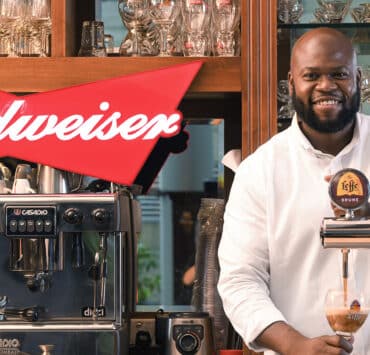|
Getting your Trinity Audio player ready...
|
Stacey Werner Shapiro always knew she wanted to pursue a path to becoming in-house counsel. During law school, she initiated an internship at a television station, where the general counsel gave her advice that wound up being taken to its logical extreme in amazing ways.
“At the time, lawyers were becoming very niche-oriented and specialized,” Werner Shapiro remembers. “She told me to do exactly the opposite, to go out and get experience in as many different subjects as I possibly could, because when you’re in-house, you never know what’s going to come across your desk. If you look at my resume, that’s exactly what I did, I became a Jill-Of-All-Trades.”
Hospitality, media, commercial contracts, employment, intellectual property, data security, and M&A make up barely a third of Werner Shapiro’s job history. If being well-rounded is the key to in-house success, Werner Shapiro is a perfect circle.
The attorney has spent the last twelve-and-a-half years at Choice Hotels International, where she currently serves as vice president and assistant general counsel. Werner Shapiro, who willingly says yes to a challenge, has coupled her desire to learn and build expertise with care and compassion for her own team’s development. She maintains the importance of leadership investing in her own people, not just herself.
“To be an effective business partner, you have to be willing to be a little vulnerable.”
Stacey Werner Shapiro
That entire philosophy seems to start with Werner Shapiro’s focus on resetting the idea of what being a lawyer means in-house.
“Lawyers are taught to be the smartest person in the room,” Werner Shapiro says, almost wearily. “I have never had that approach. To be an effective business partner, you have to be willing to grow and be a little vulnerable. You have to build trust, and to be willing to ask questions when you don’t understand.”
If she doesn’t know, the attorney is going to figure it out. Werner Shapiro wants to learn her clients’ issues from the inside out, to the point that she jokes that she’ll ask to be explained an issue like it’s written in one of the popular For Dummies series. “I’m not going to be effective if I don’t understand your goal,” the attorney explains.
Choice Hotels follows a “growth mindset” principle, and Werner Shapiro is recognized as someone who exemplifies it. Her career development and growth parallels that of the company, and she has been called upon time and again to help build, lead, and enable transformative initiatives. One example was the opportunity Werner Shapiro had during the company’s acquisition of WoodSpring Suites in 2018. The lawyer wasn’t working alone, but she was tasked with becoming a sort of subject matter expert on what the business wanted to achieve with the acquisition and looping in the appropriate stakeholders from the legal team, as needed.
The deal required successful partnership across departments, and Werner Shapiro’s legal knowledge was just as important as her ability to collaborate and leverage subject matter experts.
Although she can’t get into specifics, one of Werner Shapiro’s favorite moments with Choice Hotels demonstrates how fundamentally understanding the business objectives, history, and underlying documents can yield returns. As the lead attorney on a complex, multiyear venture, Werner Shapiro was asked if there was a way for the business to achieve a desired outcome that seemed out of reach.
“Tell me what is meaningful to you, and we will try and find a way to get you there”
Stacey Werner Shapiro
Knowing the matter well, she scrutinized the underlying documents, asked the internal team and partners some key questions, and advised the team to trigger a technical mechanism within the governing document that led directly to an influx of additional revenue. This legal tour-de-force was recognized by senior leaders as a substantial and meaningful win for the business.
Through all these significant accomplishments, Werner Shapiro routinely comes back to speaking about her team. She spent years building a strong team with a reputation for partnership and driving results. “To truly succeed and implement workable solutions, you must be able to build trust and knowledge by working together as a team,” she says. Throughout that journey, she demonstrates a willingness to encourage her people to pursue their desired career paths, even if that leads them outside of the organization. It comes back to investing in relationships and communication.
“I regularly tell members of my team, ‘if you are willing to be open and share what is meaningful to you, I will try and find a way to help get you there.’ The best part about being a manager is helping people gain skills and experiences as they develop their own careers.”
It’s the growth mindset of someone who knows the benefits of moving in different directions and accumulating experience to be effective in-house. But what’s most clear about Werner Shapiro is the personal investment and satisfaction she gets from seeing her people grow on their own. And, whether she wants to admit it or not, that might make her the smartest person in the room.
Stacey Werner Shapiro’s perspective on life-long learning and the ability to have a positive impact on others through allyship and multi-year DEI efforts was shaped through personal experience. Werner Shapiro grew up in Teaneck, New Jersey, the first community that didn’t wait for a court order to integrate its school system in the 1960s. It’s a point of pride that lasted through Werner Shapiro’s own K-12 education, when civil rights leaders came to her public schools, read to her class, and spoke with them about their experiences.
“I was lucky to be raised in a community where we had access to civil rights leaders, where my classmates and I were reflections of a great melting pot of religions, ethnicities, races, and gender identities. As an American Jew, I had the opportunity to experience first-hand the things we all had in common as human beings, while also celebrating the differences that we each brought to the table.”
Yet even with this foundation, the community’s reputation would be fractured when a white police officer killed a black classmate, Phillip Pannell. The aftermath deeply affected the school-aged Werner Shapiro. “The parallels of what we experienced as a community in the spring of 1990, and what this nation experienced in the winter and spring of 2020, are painful and frankly outrageous.”
The lessons Werner Shapiro learned growing up led her to pursue an interest in employment law, starting with a clerkship at the Equal Employment Opportunity Commission, provided additional context and motivation during her three-year tenure as a member of Choice Hotels’ Diversity Advisory Council, and propelled her to pursue a DEI workplace certification, which she is currently working through.
A desire to make a difference also led Werner Shapiro to become a member of the development committee of her alma mater, Penn State’s Holocaust, Genocide, and Human Rights Education Initiative, which enables K–12 educators to teach difficult topics effectively, such as racism and trauma. Werner Shapiro has tried to live her life, both personally and professionally, in a way that demonstrates tolerance, respect, and compassion. “Now, as an adult, I am finding ways to make an impact, so that the world my two children grow up in doesn’t forget just how far we’ve come, and how far we have yet to go,” she says.


